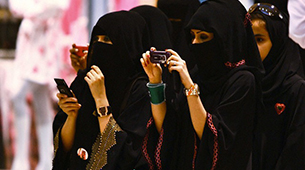Photo from Creative Commons
 A few weeks ago, ABC Family gave the green light for television writer Brooke Eikmeier to shoot the pilot for her new series, “Alice in Arabia.” The show was canceled after the network released a brash and irresponsible series description. The description reinforced Muslim stereotypes using a toxic combination of words: “American teenage girl,” “kidnapped,” “Saudi Arabian,” “prisoner” and “surviving behind the veil.” It’s no surprise Twitter erupted with rage causing ABC to pull the plug on Eikmeier’s show four days after approving it.
A few weeks ago, ABC Family gave the green light for television writer Brooke Eikmeier to shoot the pilot for her new series, “Alice in Arabia.” The show was canceled after the network released a brash and irresponsible series description. The description reinforced Muslim stereotypes using a toxic combination of words: “American teenage girl,” “kidnapped,” “Saudi Arabian,” “prisoner” and “surviving behind the veil.” It’s no surprise Twitter erupted with rage causing ABC to pull the plug on Eikmeier’s show four days after approving it.
I read Eikmeier’s response to the “media mob” that “killed” her television series. It seems that she is missing the point. Muslim-Americans were not her intended audience, but she should have taken them into greater consideration. I would imagine that most Muslim women are tired of being portrayed as the oppressed woman forced behind a cloak or hijab, probably as much as I am tired of seeing the black woman portrayed as the hyper-sexed mistress aka the “side-chick.” If I see one more lead black female character sneaking a quickie with a married man, I am going to scream. As far as “Alice in Arabia,” the network’s description was tragic, but it has revived an old discussion: diversity in Hollywood.
There is a problem in Hollywood and it is bigger than “Alice in Arabia.” The majority of stories on television are told by one voice. A white voice. The 2014 Hollywood Diversity Report shows that minorities are underrepresented by a factor of 9-to-1 among creators of broadcast comedies and dramas. Mindy Kaling, Shonda Rhimes, Tyler Perry and Mara Brock Akil are some minority writers who have found a way to fit into this 1-to-9 ratio. Would “Alice in Arabia” have a chance if it were written by a hypothetical woman named Aaqilah Majeed? Maybe. Or, maybe not, but it looks like ABC Family has thought about this idea.
Almost a month before cancelling “Alice in Arabia,” ABC partnered with a Muslim organization to host a television writing workshop for Muslim-American writers. This is a step in the right direction. After all, Muslims can write. Muslims have a wide-range of stories that extend far beyond a “veil.” (Heck, most of the Muslims that I know don’t even wear veils.) Muslim writers have a perspective that allows them to use Muslim stereotypes in a constructive way, if they chose to.
Now, can a white woman write a story about Muslim woman issues? Absolutely. Especially if the story gives an accurate and well-balanced portrayal of the culture. Based on the description of “Alice in Arabia,” this show was not balanced. Eikmeier should realize that the media mob did not kill her series, but the stereotyped descriptions did. And while the stereotyped descriptions might have ended her show, it has reignited the diversity question in Hollywood. I hope Muslim writers will continue to use this spotlight to discuss these issues and tell their diverse stories.





















